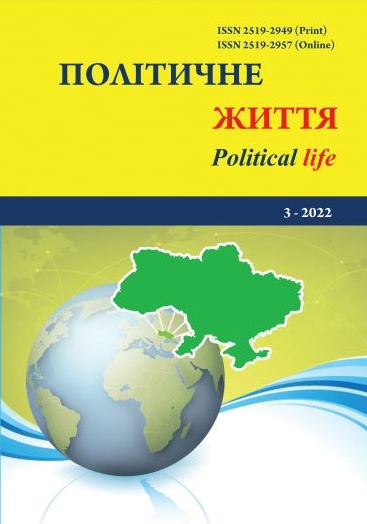Problems and ways of UN transformation in the context of the Russian-Ukrainian war
DOI:
https://doi.org/10.31558/2519-2949.2022.3.15Keywords:
The United Nations Organization; A. Guterres; Russian-Ukrainian war; Security Council; General Assembly; vetoAbstract
The article makes a brief excursion into the history of international relations and focuses on the search by the world community for uniform rules of international life and relevant mechanisms for its regulation. It is noted that this epochal search was implemented during the formation of the first system of international relations in the XVII century. After each of the 5 established systems of international relations had been formed, peoples agreed on the rules of international coexistence and created relevant international security institutions. The most renowned are the League of Nations and the United Nations Organization.
The article claims that it was the UN, created after World War II, which functioned as an universal, legitimate and official mechanism for regulating relations between states.
The author emphasizes that after the collapse of the USSR, the Yalta-Potsdam system of international relations ceased to function. The old UN still continues to operate, albeit under new geopolitical conditions. Examples of inefficiency of the UN in exercising its authority in modern circumstances are given; most importantly, we are talking about ineptitude in the prevention of international conflicts. The inefficiency of the UN structures and their leaders in the context of the treacherous attack of the Russian Federation on Ukraine and the unleashing of a full-scale Russian-Ukrainian war is clearly visible. The visit of UN Secretary General A. Guterres to Ukraine and its results are described. The principal approaches and models for reforming the UN proposed by states, regions, groups of diplomats are considered. The contribution of domestic diplomats to the renewal and reform of the UN is highlighted and specified. The conclusion is justified that Ukraine will play leading role in creation of post-war international security system.
References
Детальніше про це: ООН у системі міжнародних відносин: історичний досвід і перспективи: Ювілейний науковий збірник. Київ: Либідь, 1995. 128 с.
Бруз В.С. ООН і врегулювання міжнародних конфліктів. Навчальний посібник. Київ: Либідь, 1995. 111 с.
Українські національні новини. 2022. 23 квітня
Іваницька О.П. Історія міжнародних відносин (1918-1945 роки). Навчальний посібник. Київ: Видавничий Дім «Слово». 2011. С. 465-469.
Морозов Г. Лига Наций – взгдяд через полвека. Вопросы истории. 1992. №2-3.
Полянський П. Ідея створення ООН та її здійснення. Політичні торги між СРСР та США за місця в ООН. Нова політика. 1997. №4. С. 7-10.
Люккетофт Моргенс. Хто має керувати Організацією Об’єднаних Націй? Дзеркало тижня. 2016. 9 квітня.
Ильина О.Е. США и ООН: новые перспективы их отношений. США-Канада: Экономика, политика, культура. 2010. №1. С.29-44.
Юрченко М. Позиция США по реформированию ООН. Мировая экономика и международные отношения. 2009. №1. С.111-116.
Удовенко Геннадій. Під знаком реформування ООН. Політика і час. 1998. №2. С.3-13.
, Мартинов А. Позиція України щодо реформування ООН. Політика і час. 2005. №9. С.18-25.
Требін М.П. ООН на шляху реформ. Вісник Національного юридичного університету імені Ярослава Мудрого. 2018. № 4 (39). С.76-93.

